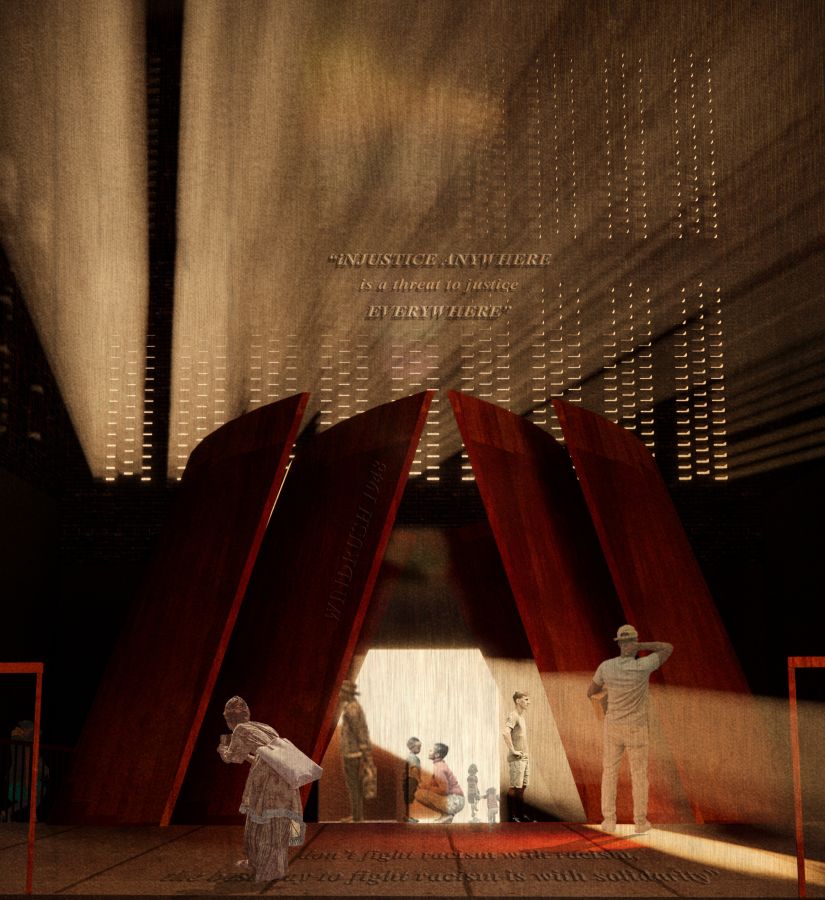In June 2020, just before the celebratory End of Year show was launched and in the context of the Black Lives Matter Call to Action in light of the sad death of George Floyd, a group of students at the MSA emailed the acting Heads of School requesting a statement be made in response to the horrendous racist violence, in support of and in 'ally-ship' with the Black Lives Matter Movement as they were extremely disappointed that MSA had not made an immediate statement. A statement was made by Professor Uduku at numerous faculty meetings, at the launch of the MSA end of year show and online awards evening and at all introduction to external examiners during June 2020.
Afterwards Helen Aston and Professor Ola Uduku responded to this Call, by meeting with the final year MArch students to discuss their concerns, proposals and suggestions and how in a collaborative way the MSA as a community could move forward.
The EDI Code of Practice for the Manchester School of Architecture has been instigated by the activities of the BLM_Arch@MSA Team of students whose work we acknowledge in prompting the creation of the document. This is a text that remains in constant development and will be incorporated as a key document that signifies Manchester School of Architecture's commitment to being a fully inclusive and socially driven Architecture School, which is welcoming to all its students, staff and all who contribute and engage with the MSA.
The current position that the MSA has taken is that of being committed to delivering a socially engaged curriculum in a general fashion across the School. There has been no critical reflection on what this actually has achieved in practice. We have neglected addressing the clear racial disparities in staffing at all levels in the School. Furthermore, the decolonisation of our curriculum content is improving, but other areas of inclusivity have yet to become mainstream in our claim to address and welcome diversity.
Core agendas that the code discusses are action plans towards:
- addressing lack of diversity in practitioners in guest speaker and guest studio reviewers
- MSA scholarships
- specific not generic mentoring
- decolonising theoretical and design education
- further diversification of reading lists
- improving resources for Black and minority students
- further outreach to colleges
- improving the representation of POC in all aspects of Architectural Teaching
- accelerating change to remove barriers
For MSA to achieve transformational change in all areas of inclusivity and diversity. It is essential that there is a commitment to changed practices in all areas that will need to take place over a defined time scale; from the immediate, to the long term. This is what this Code of Practice seeks to provide the framework to deliver.
The events surrounding the death of George Floyd in the USA in 2020 and the call for racial justice across the world propelled us as a school community to reflect on our own practices and our stance on racism, but additionally a stance on wider agendas regarding equity, diversity and inclusivity. While we have always tried to ensure that all students are in a safe and welcoming environment, we admit that more work is always possible. In response to the Call to Action by the @blm_archmsa group and in consultation with this group we are proud to announce that going forward, the MSA is an anti-racist School. This means that we no longer believe it is good enough to not be racist. Being anti-racist means all members of our school community will tackle racism wherever we find it, including within ourselves. We will embed the two anti-racist principles of personal accountability and action into all aspects of life at the MSA in order to ensure every single student, guest and staff member is respected and cared for so that they can flourish. As an anti-racist school, the MSA will be a community in which we work, learn and grow together with equity.
Architecture especially has had a direct link to equality and diversity issues. Stephen Lawrence, the Black British student who was murdered in 1993 in South London, had intended to study Architecture. The Stephen Lawrence Foundation, (now renamed Blueprint for All) was set up in his memory. The Foundation had at its core the aim to improve access and higher education opportunities for minority groups. In the twenty-five years of its existence, the number of students in architecture from a British Black minority background have only marginally increased. Students of colour and their allies in British Architecture Schools were engaged in the 2020 BLM demonstrations, expressing a range of demands from the decolonisation of the curriculum to better representation across all parts of the Architecture profession.
Helen Aston and Professor Ola Uduku


